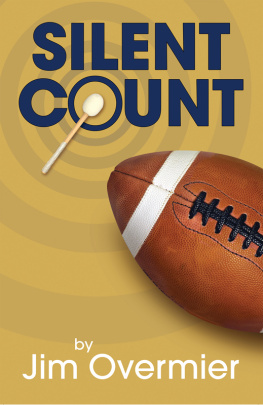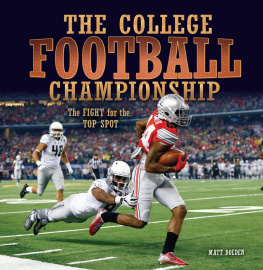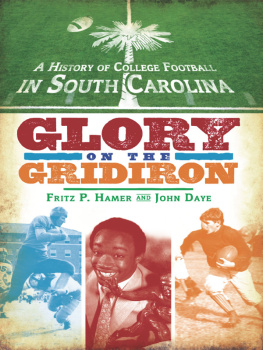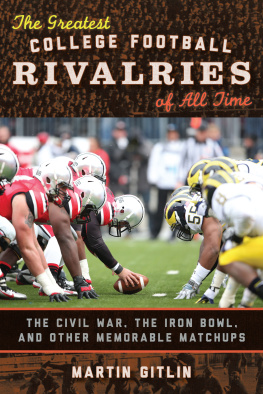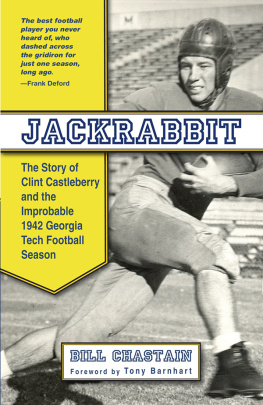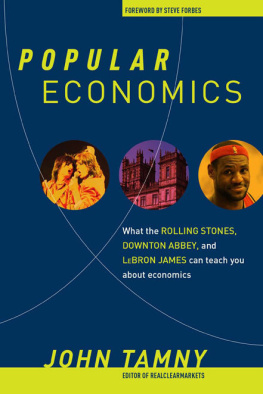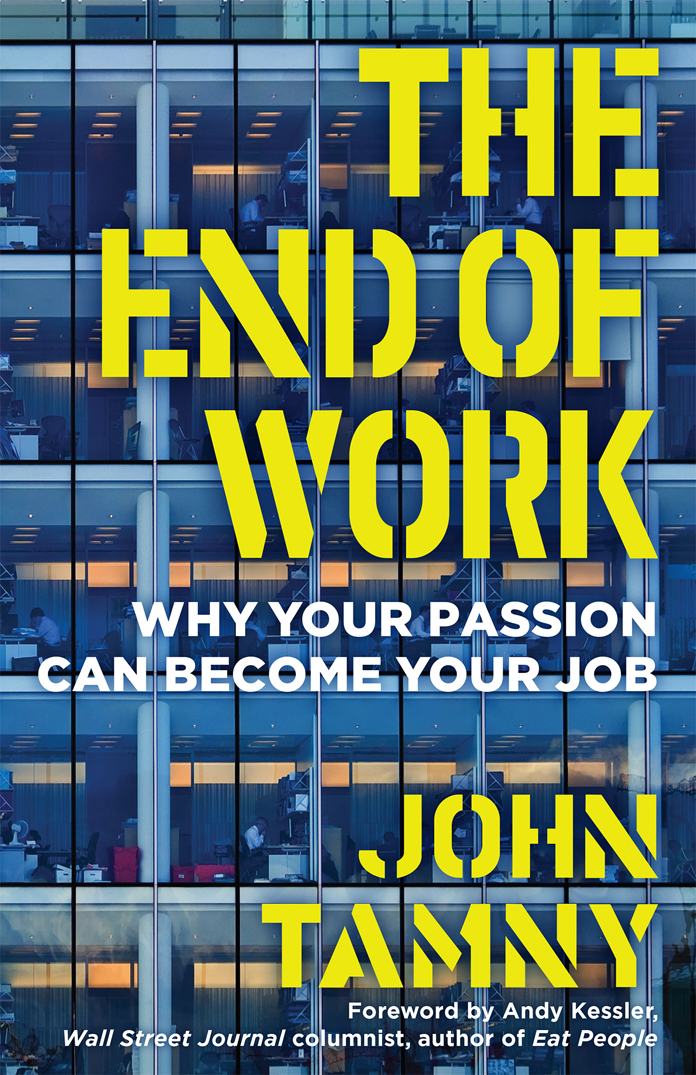PRAISE FOR
THE END OF WORK
In the hands of other writers, economics has long been known as the dismal science. But when you read John Tamny you come to love economicsbecause he draws from so many fun and fascinating sources, from the Beatles to Xbox, to make it come alive. Best of all, The End of Work pierces through all the gloom and doom surrounding current trends of automation and artificial intelligence to advance a positive vision for the future of American workers. It rests on something called Tamnys Law, and all smart people will want to read this book to know what that is.
James Rosen, author of The Strong Man: John Mitchell and the Secrets of Watergate and Cheney One on One
John Tamnys The End of Work is the answer for everyone who dreads Mondays. In this entertaining book, he shows how passion is becoming the path to a paycheck. The future of work is bright!
John Mackey, CEO of Whole Foods
Professional video game players, video game coaches, NFL Insiders? John Tamnys exciting book about the explosion of jobs that dont feel at all like work will resonate with those fearful about the future. Its going to be glorious.
Adam Schefter, ESPN NFL Insider
The United States is where the worlds ambitious have long come to make their mark. John Tamny shows why. There are so many things that make America great, but arguably its best attribute is that its freedom correlates with more and more people showing up to work each day with joy in their hearts.
Jos Andrs, Chef/Owner, ThinkFoodGroup and Founder, World Central Kitchen
Robust economic growth frees us from the burden of jobs that require little skill, are not satisfying, and leave most people facing Monday with dread. As robots replace humans in certain kinds of jobs, new, impossible-to-foresee jobs will be created, and fewer and fewer people will be going to work. As John Tamny reminds us, theyll be pursuing their passions.
Bill Walton, Chairman of Rush River Entertainment and host of The Bill Walton Show


Copyright 2018 by John Tamny
All rights reserved. No part of this publication may be reproduced or transmitted in any form or by any means electronic or mechanical, including photocopy, recording, or any information storage and retrieval system now known or to be invented, without permission in writing from the publisher, except by a reviewer who wishes to quote brief passages in connection with a review written for inclusion in a magazine, newspaper, website, or broadcast.
Regnery Gateway is a trademark of Salem Communications Holding Corporation
Regnery is a registered trademark of Salem Communications Holding Corporation
Cataloging-in-Publication data on file with the Library of Congress
ISBN 978-1-62157-847-5
Published in the United States by
Regnery Gateway
An imprint of Regnery Publishing
A Division of Salem Media Group
300 New Jersey Ave NW
Washington, DC 20001
www.RegneryGateway.com
10 9 8 7 6 5 4 3 2 1
Books are available in quantity for promotional or premium use. For information on discounts and terms, please visit our website: www.Regnery.com.
For Claire,
may you never know what
it is to dread Mondays.
CONTENTS
Table of Contents
Guide
Andy Kessler
W hat do you do? We all get asked this at meetings, interviews, cocktail parties, everywhere. Its almost as if the person asking is trying to put you in some cubby and figure out how you tick by branding you as a certain type of person, which magically unlocks the mystery to your personality. But these days, there are so many interesting, bizarre, and confusing answers to What do you do? that its hard to put someone into a predefined box anymore.
Depending on who is asking and my mood at the time, Ive got lots of choice responses. Nowadays I say that Im a writer. Or an author if I think someone might actually read one of my books. But Ive also been a Wall Street analyst, an investment banker (briefly, until I found out you had to be nice to people) a venture capitalist, and for many years I ran a hedge fund. But Im an engineer by training and used to design chips, install computer systems, run networks, and write code. Ive even written a few video games. Oh yeah, and Ive been a waiter, a car hop at a root beer stand, and even a bakers assistant. (Actually, I washed pans, but he once let me put poppy seeds onto buns.) Im likely to answer with any one of these or at least try to work them into a conversation.
But as I look back, I dont consider any of them to be a job. The Navy used to run recruiting ads on TV with the tag line delivered in a deep booming voice, Its not just a job, its an adventure. Thats how Ive always felt. I got a paycheck, but it almost never felt like work. It felt like, well, an adventure. New ideas to explore every day, new puzzles to solve, new concepts to explore, new things to learn. Whats not to like? Im not a morning person, but because it didnt feel like work, it felt like going to Disneyland. I was mentally ready (almost) every morning to start work.
Anyway, if it ever did feel like work, because I had a boss who was a jerk, I would quit and figure out something else to do. If you sum up all the jobs youve ever had, its a career. Looking back on my so-called career, I see it as a game of pinball, bouncing from one bumper to another until I found something interesting enough and lucrative enough and free enough of annoying bosses to make me stick around for a while and figure it out.
Of course, when I look back at all this, it scares the crap out of me. At any point I could have ended up at a dead end or fired or unemployed. It wasnt the typical career path for the 1970s and 80s: doctor, lawyer, accountant, management, public service, military, or some other regimented and often narrow path. But my wandering worked.
I often wonder why. Really, why? By all means, coming out of central New Jersey in the fog of the 1970s, I should have ended up working in a factory. I did spend years getting an engineering education, so maybe I was more likely to end up at IBM perfecting some widget and wearing a white short-sleeve shirt, clocking in at precisely 8:11 a.m. and out at 4:42 p.m., with a twenty-two-minute lunch. Or maybe Id have ended up crunching numbers wearing green eyeshades, only to be replaced by an electronic calculator that was faster and more accurate.
But I didnt. Why? Was I privileged? Heck no. Lucky? Maybe. Right place, right time? Perhaps.
Though few saw it at the time, technology was completely changing work in the United Stateshow it was organized and how the idea of labor evolved into human capital, with brains being more important than brawn.
Im sure any decent management consultant could construct a labor stack, with factory and food-service jobs, not requiring all that much brain power on the bottom; logistics, with a little brain and a little brawn, a little higher up the stack; management, which means dealing with people; and pure design, almost exclusively thinking, topping it off.
As cheap microprocessors and cheap memory have been followed by fast networking and cloud computing, technology has relentlessly advanced and allowed more and more jobs to move up the stack, leaving labor to less-developed countries. Sure, there is still manufacturing in the United States, but it tends to be higher-value products, complex machinery, and pharmaceuticals rather than clothes and consumer goods. So many jobs have moved up the stack that the United States is predominantly a service economy, meaning more and more workers are removed from grunge and sweat and turmoil and get to think for a living. Thats the secret to having a job that doesnt feel like a job.


